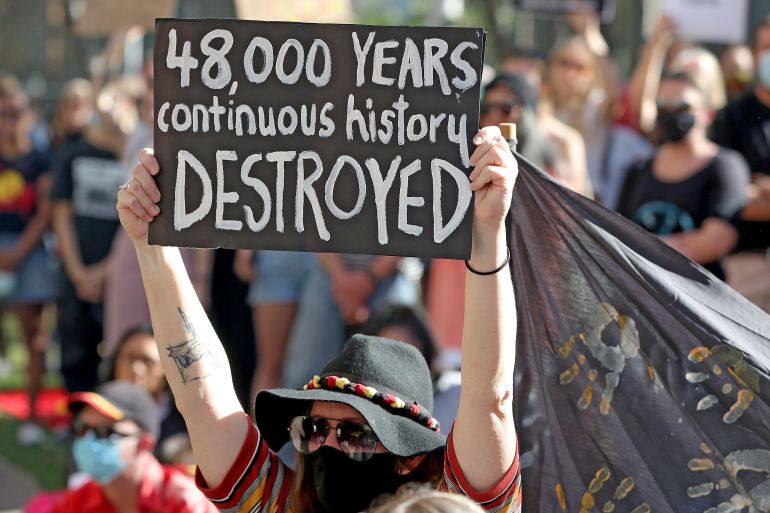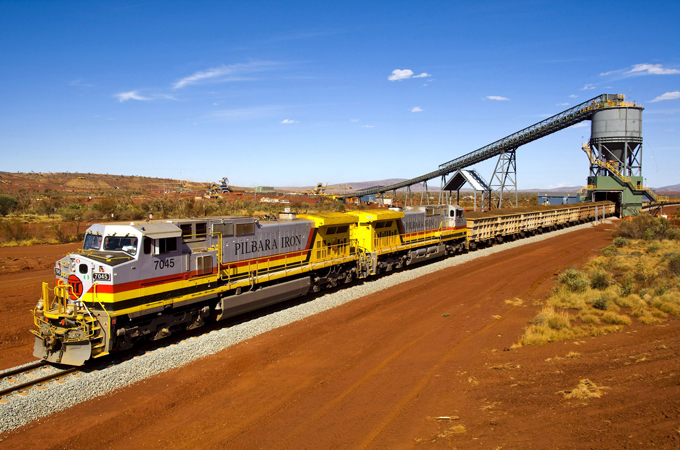Rio Tinto chairman quits over Aboriginal site damage in Australia
Anglo-Australian mining giant triggered an outcry last year when it blew up the 46,000-year-old rock shelters at Juukan Gorge.

The chairman of the Anglo-Australian mining company mining giant, Rio Tinto, has announced that he will step down after the company triggered a public outcry by destroying an ancient Aboriginal site in Western Australia to extract $135m worth of iron ore.
Rio blew up the 46,000-year-old rock shelters at Juukan Gorge last May, sparking a public backlash and investor revolt that led to the resignation of the company’s CEO and two top executives last September.
Keep reading
list of 3 itemsNative Americans try to block US move to give land to Rio Tinto
Rio Tinto’s CEO to quit after anger over Aboriginal cave blasts
The caves were one of the earliest known locations inhabited by Australia’s Indigenous people and contained some of the oldest Aboriginal artefacts ever found in the country.
Rio Tinto chairman Simon Thompson said the destruction had “overshadowed” the company’s successes in 2020 – during which it paid a record dividend to investors thanks to booming iron ore prices.
“As chairman, I am ultimately accountable for the failings that led to this tragic event,” he said in a statement.
Thompson said he would not seek re-election at the company’s annual general meetings in 2022, allowing a transition period until a replacement is appointed.
He called the destruction “a source of personal sadness and deep regret, as well as being a clear breach of our values as a company”.
The company’s non-executive director Michael L’Estrange will also retire from the board after this year’s meetings.
‘Never again’
Thompson and L’Estrange have come under pressure to leave after what was seen as the board’s mishandling of an investigation into the destruction that found no single person accountable.
Thompson came under even more criticism last month after elders of the Puutu Kunti Kurrama and Pinikura people (PKKP) accused him of breaking a personal promise.
The Juukan Gorge site was considered sacred by the PKKP of Western Australia.
Although Rio Tinto had permission from the state government to blast in the area, the PKKP said they had warned that the placement of some explosives would destroy two heritage rock shelters.
A parliamentary inquiry into the destruction recommended the mining firm pay restitution, rebuild the destroyed site and commit to a permanent moratorium on mining in the area.

“Never again can we allow the destruction, the devastation and the vandalism of cultural sites as has occurred with the Juukan Gorge – never again,” said Warren Entsch, the chairman of the investigative panel said when an interim report was released in December.
While the full parliamentary inquiry report is not due until the second half of this year, the panel emphasised that Rio Tinto must carry out the reconstruction and rehabilitation at its own expense.
All artefacts taken from the destroyed sites must also be returned, and all agreement reached with traditional owners of the holy sites must be reviewed.
The Australasian Centre for Corporate Responsibility (ACCR), an activist group with shares in Rio Tinto, had also pointed out that while company officials understood the historic importance of the Aboriginal site, it still decided “to blow them up anyway”.
“What sort of person arrives at this decision? What sort of company puts, and keeps, them in charge? What kind of CEO refuses to take any responsibility for the actions of his senior management?” ACCR director Brynn O’Brien was quoted by news reports as saying.
According to estimates, Rio Tinto has a valuation of $123bn. The company is also facing several allegations of corruption and environmental destruction in other parts of the world, including in China, Papua New Guinea and the United States.